| Srl | Item |
| 1 |
ID:
150942
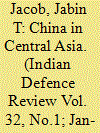

|
|
|
| 2 |
ID:
106166
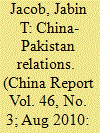

|
|
|
| 3 |
ID:
100614
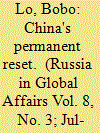

|
|
|
| 4 |
ID:
155018
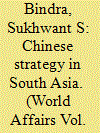

|
|
|
|
|
| Summary/Abstract |
Sukhwant S Bindra traces the changes in Chinese diplomacy over the past few decades, with special reference to India, Pakistan, other South Asian countries and Russia. He points out that the Sino–Pak alliance has grown out of converging interests, although Beijing is wary of Pakistan’s internal instability and support of Islamic radicalism in Asia. He concludes that India has no choice but to simultaneously collaborate with and stand up to China.
|
|
|
|
|
|
|
|
|
|
|
|
|
|
|
|
| 5 |
ID:
129695
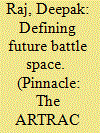

|
|
|
| 6 |
ID:
118778
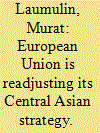

|
|
|
| 7 |
ID:
128216
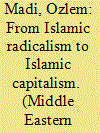

|
|
|
|
|
| Publication |
2014.
|
| Summary/Abstract |
The rise of Turkish Islamic capitalism, and with it an Islamic bourgeoisie and the accompanying lifestyle has profound implications for the Muslim world, since the Turkish Muslims have been backed by a relatively successful democratic and liberal system that has allowed them to integrate more easily into the global system. Focusing mainly on the members of the Islamic-oriented Association of Economic Entrepreneurship and Business Ethics (?G?AD), the aim of this article is to demonstrate the inherent (in)compatibility and contradictions between Islam and capitalism in contemporary Turkey, and by extension in the Muslim world. From the start, for the Turkish Muslim bourgeoisie, the burning questions were 'how to earn' and, more importantly, 'how to consume' within a capitalist system while still not transgressing Islamic boundaries. In order to overcome these challenges, the article argues that, rather than creating an 'alternative Islamic economic system', Islamic actors have reduced - in some cases, even eliminated - this discursive and ideological tension between Islam and capitalism by (a) trying to introduce Islamic morality into capitalism and (b) redefining both Islam and capitalism. Through these mechanisms they have also broadened and deepened Turkish modernity.
|
|
|
|
|
|
|
|
|
|
|
|
|
|
|
|
| 8 |
ID:
032517
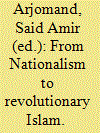

|
|
|
|
|
| Publication |
London, Macmillian Press, 1984.
|
| Description |
xxi, 256p.hbk
|
| Series |
St. Antony's/Macmillan Series
|
| Standard Number |
0333353692
|
|
|
|
|
|
|
|
|
|
|
|
Copies: C:1/I:0,R:0,Q:0
Circulation
| Accession# | Call# | Current Location | Status | Policy | Location |
| 025923 | 956.82/ARJ 025923 | Main | On Shelf | General | |
|
|
|
|
| 9 |
ID:
103036
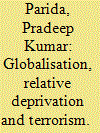

|
|
|
| 10 |
ID:
152906


|
|
|
| 11 |
ID:
141032
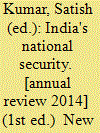

|
|
|
|
|
| Edition |
1st ed.
|
| Publication |
New Delhi, Routledge, 2015.
|
| Description |
xviii, 493p.: ill.hbk
|
| Standard Number |
9781138191273
|
|
|
|
|
|
|
|
|
|
|
|
Copies: C:1/I:0,R:0,Q:0
Circulation
| Accession# | Call# | Current Location | Status | Policy | Location |
| 058325 | 355.033054/KUM 058325 | Main | On Shelf | General | |
|
|
|
|
| 12 |
ID:
149286
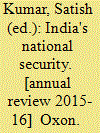

|
|
|
|
|
| Publication |
Oxon, Routledge, 2016.
|
| Description |
xvii, 442p.: ill.hbk
|
| Standard Number |
9781138282841
|
|
|
|
|
|
|
|
|
|
|
|
Copies: C:1/I:0,R:0,Q:0
Circulation
| Accession# | Call# | Current Location | Status | Policy | Location |
| 058900 | 355.033054/KUM 058900 | Main | On Shelf | General | |
|
|
|
|
| 13 |
ID:
160407
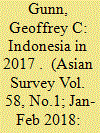

|
|
|
|
|
| Summary/Abstract |
In mass demonstrations spearheaded by a coalition of Islamic radicals, 2017 witnessed a polarizing assault on the nation’s broadly secular founding creed, Pancasila. With the arrest and imprisonment of the popular ethnic-Chinese Christian mayor of Jakarta on spurious blasphemy charges, even the Indonesian president was left on the back foot and obliged to push back.
|
|
|
|
|
|
|
|
|
|
|
|
|
|
|
|
| 14 |
ID:
088144
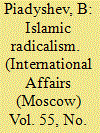

|
|
|
|
|
| Publication |
2009.
|
| Summary/Abstract |
EXPERTS, ACADEMICS, political scientists and politicians gathered for a round table discussion at the Diplomatic Academy of the Ministry of Foreign Affairs of the Russian Federation to talk about Islamic radicalism, one of the hottest issues on the Russian and Central Asian agenda.
A. Pushkov, Director of the Institute of Contemporary International Studies at the Diplomatic Academy(ICIS), pointed out that the transition from unipolar America-dominated world to a multipolar world order added even more urgency to the issue under discussion.
Below is the whole range of opinions offered by the guests at the round table.
S. Nikolaev (Deputy Director, Third Department of the CIS Countries, Ministry of Foreign Affairs of the Russian Federation) deemed it necessary to point out that Russia wants stability and security in Central Asia to be able to strengthen its strategic and allied relations with the local states, to address together the entire range of regional problems including terrorism, extremism and illegal drug trafficking.
Russia is also involved in bilateral humanitarian cooperation; it pays particular attention to the defense of the rights and interests of compatriots, is doing a lot to preserve the positions of the Russian language in these countries, to expand the Russian educational, cultural and information space in all of them. Those involved in these activities are fully aware of the potentials offered by the civil society as a whole and the Russian World Foundation in particular.
The political heavyweights - China, America, Japan, and the European Union - are displaying more interest than before in Central Asia. This does not worry Russia: for objective reasons sooner or later Central Asia will be integrated into wider cooperation formats which will add vigor to competition in all spheres. The Russian Federation does not claim the role of a monopolist in all Central Asian developments and is open for cooperation with other states.
|
|
|
|
|
|
|
|
|
|
|
|
|
|
|
|
| 15 |
ID:
150601


|
|
|
|
|
| Summary/Abstract |
The global security system is very much endangered by a new challenge from non-state actors like ISIS with membership from different countries. The post-9/11 world compelled United States of America to review its security system. The US counterterrorism efforts in the Af-Pak region and the terror attacks on Indian cities brought India and the US to join hands to work out strategies for countering terrorism. The need of the hour is to build up confidence and trust in each other and readjust their perspectives on the threat of terrorism by understanding various causes of the development of religious radicalism.
|
|
|
|
|
|
|
|
|
|
|
|
|
|
|
|
| 16 |
ID:
083670


|
|
|
|
|
| Publication |
2008.
|
| Summary/Abstract |
The article explores the development of Islamic radicalism in East Africa by examining specific states. The author argues that the evidence suggests that although Islamic radicalism has not made substantial inroads into the region, it may still do so, as East Africa suffers from political repression as well as socioeconomic problems. The author concludes that the region must undergo significant changes to improve political representation and socioeconomic conditions.
|
|
|
|
|
|
|
|
|
|
|
|
|
|
|
|
| 17 |
ID:
120725


|
|
|
|
|
| Publication |
2013.
|
| Summary/Abstract |
As Muslim communities reassert themselves in public life across the world, including Central Asia, their actions are causing tension in relations with 'secular' governments. Various global theories have been offered to explain these dynamics. According to one theory, tension between religious communities and secular states is caused by the exclusion or marginalization of Muslims, a process exacerbated by the perceived anti-Muslim bias in the foreign- and domestic-security policies of Central Asian states. A second view is that tension results from the work of global extremist groups espousing the restoration of an Islamic Caliphate. The third approach presents the rising tension as part of a broader trend: a putative clash of Western and Muslim civilizations. This article challenges these theories by using a case study of a Muslim grassroots protest in Kyrgyzstan to highlight the importance of local politics, namely informal arrangements among local officials, power brokers and community members. In so doing, it seeks to make a contribution to theorizing Muslim-state relations in Central Asia.
|
|
|
|
|
|
|
|
|
|
|
|
|
|
|
|
| 18 |
ID:
122087
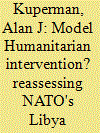

|
|
|
|
|
| Publication |
2013.
|
| Summary/Abstract |
NATO's 2011 humanitarian military intervention in Libya has been hailed as a model for implementing the emerging norm of the responsibility to protect (R2P), on grounds that it prevented an impending bloodbath in Benghazi and facilitated the ouster of Libya's oppressive ruler, Muammar al-Qaddafi, who had targeted peaceful civilian protesters. Before the international community embraces such conclusions, however, a more rigorous assessment of the net humanitarian impact of NATO intervention in Libya is warranted. The conventional narrative is flawed in its portrayal of both the nature of the violence in Libya prior to the intervention and NATO's eventual objective of regime change. An examination of the course of violence in Libya before and after NATO's action shows that the intervention backfired. The intervention extended the war's duration about sixfold; increased its death toll approximately seven to ten times; and exacerbated human rights abuses, humanitarian suffering, Islamic radicalism, and weapons proliferation in Libya and its neighbors. If it is a "model intervention," as senior NATO officials claim, it is a model of failure. Implementation of R2P must be reformed to address these unintended negative consequences and the dynamics underlying them. Only then will R2P be able to achieve its noble objectives.
|
|
|
|
|
|
|
|
|
|
|
|
|
|
|
|
| 19 |
ID:
125168


|
|
|
|
|
| Publication |
2013.
|
| Summary/Abstract |
The youth revolts . . . have shown that while regimes might be able to play the Islamic radicalism and sectarianism cards to bolster their hold on power in the short term, this is a failing strategy in the long run." Third in a series on soft power around the world.
|
|
|
|
|
|
|
|
|
|
|
|
|
|
|
|
| 20 |
ID:
148142


|
|
|
|
|
| Summary/Abstract |
QUINTAN WIKTOROWICZ and KARL KALTENTHALER focus on how spiritual incentives inspire Islamic radicalism. They argue that radical Islamic groups offer strategies for fulfilling divine duties and maximizing the prospect of salvation on judgment day. They conclude that the choice of individuals to move to high-cost and high-risk activism can be understood as a rational decision.
|
|
|
|
|
|
|
|
|
|
|
|
|
|
|
|